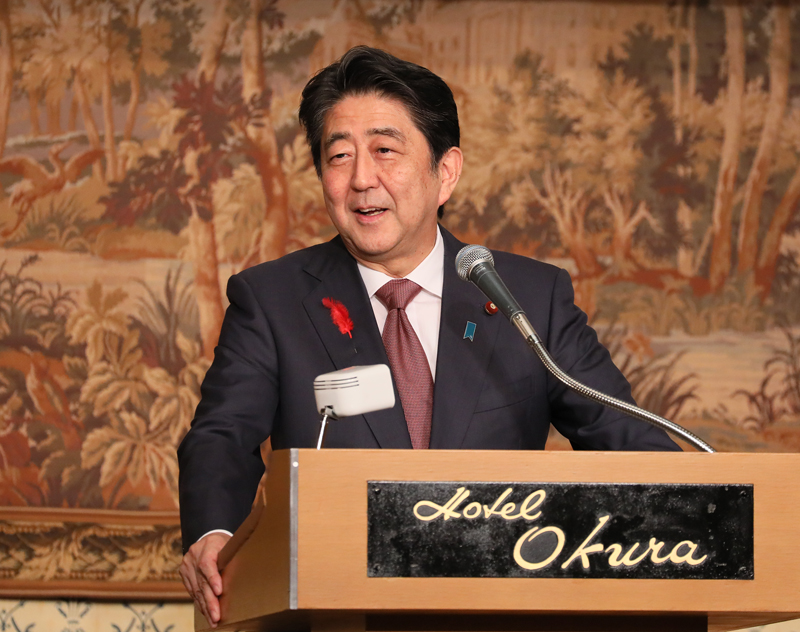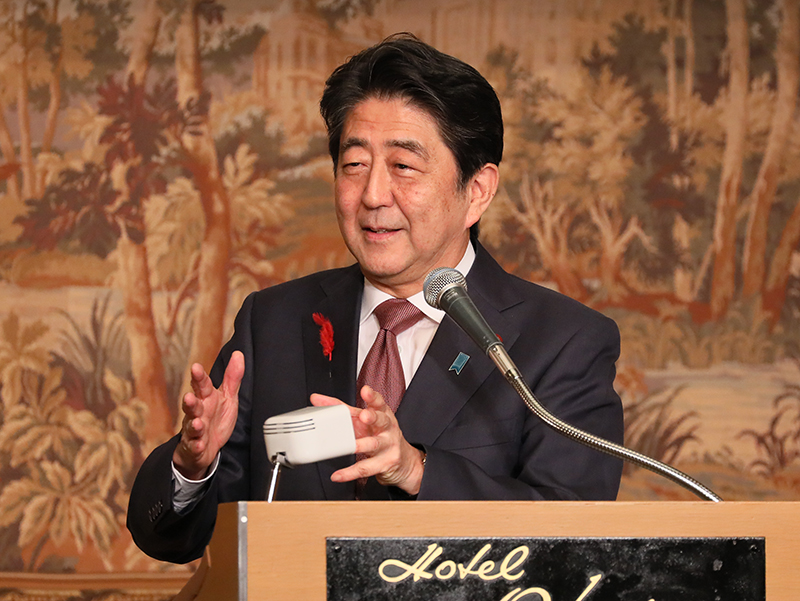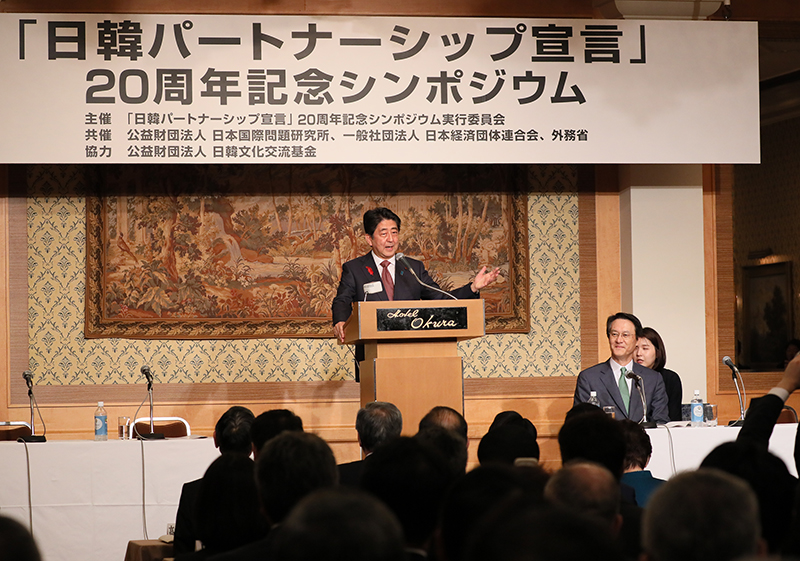Home > News > The Prime Minister in Action > October 2018 > Commemorative Symposium for the 20th Anniversary of the Japan-Republic of Korea Joint Declaration
The Prime Minister in Action
Commemorative Symposium for the 20th Anniversary of the Japan-Republic of Korea Joint Declaration
October 9, 2018
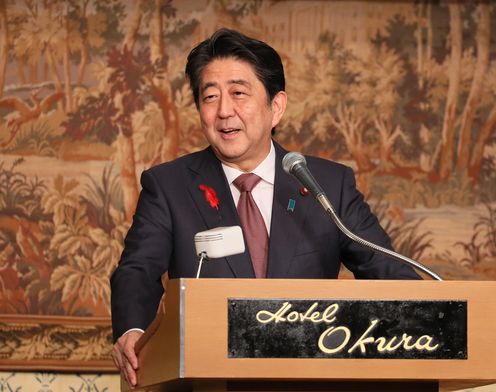
Photograph of Prime Minister Abe delivering an address
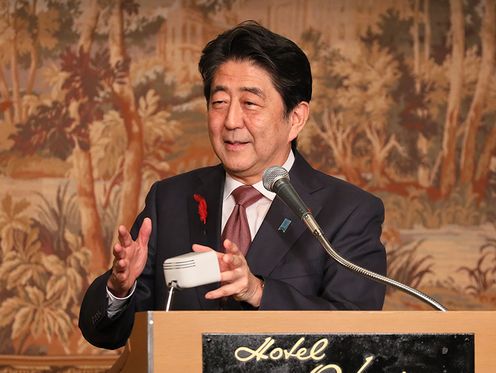
Photograph of Prime Minister Abe delivering an address
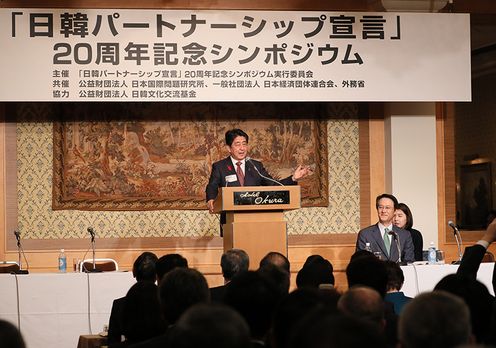
Photograph of Prime Minister Abe delivering an address
[Provisional Translation]
On October 9, 2018, Prime Minister Shinzo Abe attended the Symposium to Commemorate the 20th Anniversary of the Japan-Republic of Korea Joint Declaration held in Tokyo.
The Prime Minister said in his address,
“Ms. Chizuko Obuchi, the spouse of the late Prime Minister Obuchi, H.E. Mr. Lee Su Hoon, Ambassador Extraordinary and Plenipotentiary of the Republic of Korea, and distinguished guests, I am deeply pleased that this symposium to commemorate the 20th anniversary of the Japan-Republic of Korea Joint Declaration on a New Japan-Republic of Korea Partnership towards the Twenty-first Century is being held today, which was signed by then-Prime Minister Obuchi and then-President Kim Dae-jung.
In 1998, then-Prime Minister Obuchi and then-President Kim Dae-jung announced that the present calls upon both countries to overcome the unfortunate history and to build a future-oriented relationship based on reconciliation as well as good-neighborly and friendly cooperation in the Japan-Republic of Korea Joint Declaration that they signed.
There exist difficult issues between Japan and the Republic of Korea due to the fact that we are neighboring countries. Looking back at the past, it is true that our paths have not necessarily been smooth. Meanwhile, it is precisely through the ceaseless efforts of many people including leaders such as then-Prime Minister Obuchi and then-President Kim Dae-jung that our two countries have succeeded in overcoming numerous obstacles to build the Japan-ROK relations of today.
Even in the aspect of people-to-people exchanges, last year we saw more than 9 million people traveling between Japan and the ROK, marking a record high. In particular, the number of visitors from the ROK to Japan has increased at a rapid pace in recent years, and the ROK is second to China in the number of visitors to Japan each year. At the same time, with the growing interest in Korean culture among the Japanese, the number of Japanese visitors to the ROK has also been on the rise recently. The number of travelers between the two countries is expected to exceed 10 million people this year. We are seeing a rising trend called the third “Hanryu” (Korean boom); for example, cheese dak galbi (a spicy Korean stir-fry) has recently become immensely trendy in Japan, and K-pop singers are gaining popularity. Such vibrant people-to-people exchanges, close economic relations, and cultural exchanges are regarded as the outcome of the personnel and cultural exchanges, which were outlined by then-Prime Minister Obuchi and then-President Kim Dae-jung in the 1998 Japan-Republic of Korea Joint Declaration, and the decision made by then-President Kim Dae-jung to open up the ROK to Japanese culture.
The resolve of the two leaders 20 years ago is a legacy that has been passed down to those of us living in the present day. Last month, I held a Japan-ROK Summit Meeting with President Moon Jae-in in New York, where we celebrated the 20th anniversary of the Japan-Republic of Korea Joint Declaration and reaffirmed our determination to foster a future-oriented relationship between Japan and the ROK.
As I touched on earlier, there exist difficult issues between Japan and the Republic of Korea due to the fact that we are neighboring countries.. To overcome these issues, I believe that it is necessary for the political leadership to make big decisions. It was precisely at the time when then-President Kim Dae-jung visited Japan for the summit meeting with then-Prime Minister Obuchi, I remember that Mr. Takamura, who will be presenting a lecture today after this, was the foreign minister at the time and I was a young and fresh member, much more fresh than today, of the Diet then. I was in the position to apply peer-pressure on the administration, so to speak, as a young member, and I often visited Mr. Takamura’s office to say various things. I have just recalled this suddenly. Anyway, I think that relations between the two countries will become future-oriented and begin to move forward only when the leaders overcome such pressures and various public opinions, and make decisions from a broad perspective of the situation. Hence, I would like to apologize once again to Mr. Takamura, then-foreign minister, for having made some discourteous remarks to him at the time. Moreover, we should also make our decisions from a broad perspective going forward.
I, as well, hope strongly that we can build a future-oriented relationship, so that the young people of Japan and the ROK can foster friendships through mutual exchanges, and work toward their dreams for the future together. As I give my thoughts to then-Prime Minister Obuchi and then-President Kim Dae-jung, I hope to work together with President Moon Jae-in for the development of the Japan-ROK relationship.
In closing, I would like to express my sincere respect to all who have contributed their best efforts to hold this symposium, including the executive committee, Keidanren, the Japan Institute of International Affairs, and the Japan-Korea Cultural Foundation. I would like to express my hopes for the further development of Japan-ROK relations, and to wish you all good health. Once again, my sincere congratulations.”

